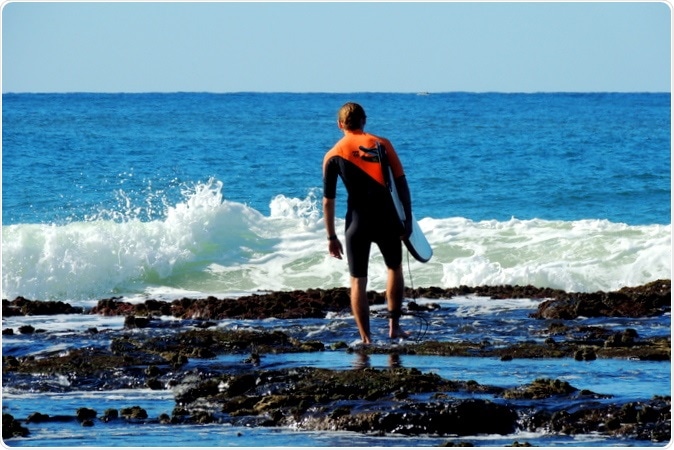A new study has found that surfers and body boarders are more likely to get antibiotic resistant Escherichia coli (E. coli) in their guts compared to non-surfers. The study from the researchers at the University of Exeter was published in the January 2018 issue of the journal Environment International.

Image Credit: Surfers more likely to get antibiotic resistant E. coli in their guts
The reason behind this study was the fact that surfers tend to swallow more polluted and bacteria laden sea water than rest of the population. The authors write about the estimated 2.5 million water sports sessions that were organized in 2015 in England and Wales that resulted in the ingestion of these resistant bacteria.
The team of researchers looked at 273 people in their Beach Bums study. Half (143) of these individuals are regular surfers at the UK coastline. All of the participants agreed to provide swab samples of their rectum for analysis in the microbiology labs for infective pathogens.
These swabs of the participants were assessed to check if they contained E. coli bacteria. The bacterial was allowed to grow in a medium containing an antibiotic Cefotaxime. This is an important antibiotic used in clinical practice. The idea behind this experiment is that if the bacterial cultures show growth in presence of this antibiotic, it means that the bacteria is resistant to the antibiotic and the antibiotic would be ineffective if used against this bacteria. These new resistant E. coli bacteria strains have developed a resistance against Cefotaxime by acquiring certain mutations in their genes that help them survive this treatment.
Results of the study showed that 13 (9 percent) of the 143 surfers in the study population were shown to have the resistant E. coli bacteria strains in their gut as was seen from their rectal samples. These resistant strains were seen in the rectal samples of only 4 (3 percent) of the 130 non-surfers on the other hand.
The study results indicate that regular surfers were at least four times more at risk of getting resistant bacteria in their guts compared to non surfers. These bacteria within their guts would continue to modify and change in order to fight off the antibiotics that are routinely used against them. The resistance caused by these genetic mutations was capable of passing on to other bacteria creating a widespread resistance to the antibiotics that are routinely used. This is of grave concern. The UN Environment Assembly recently has stated antibiotic resistance to be one of the most dreaded problems in the environment that is likely to affect mankind significantly.
According to lead researcher Dr Anne Leonard, of the University of Exeter Medical School, antibiotic resistance is one of the “greatest health challenges of our time” and this study throws light on how the environment plays a role in spread of such resistance among bacteria.
The study shows how important it is to know how “humans are exposed to these bacteria” and how these bacteria end up as colonies within the guts of humans. “This research is the first of its kind to identify an association between surfing and gut colonisation by antibiotic resistant bacteria,” she said. This study further shows how contaminated the coastal waters are.
These bacteria are known to enter water sources through sewage and pollution from wastes that are usually originating from farm crops that are being treated using manure. Dr Will Gaze, of the University of Exeter Medical School who supervised this study said that this study did not aim to discourage people from taking part in water sports and activities.
These activities he said had “lot of benefits in terms of exercise, wellbeing and connecting with nature”. The idea was to understand the impact and make the “policy-makers, beach managers, and water companies to make evidence-based decisions to improve water quality even further for the benefit of public health.”
Reference: https://www.sciencedirect.com/science/article/pii/S0160412017312345